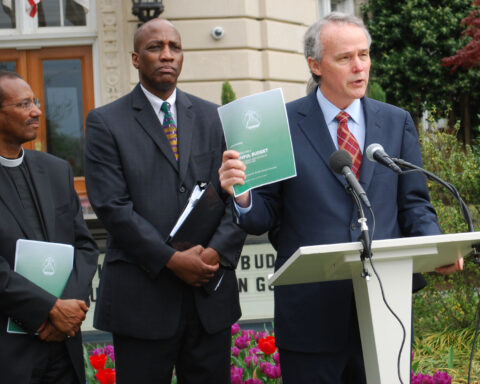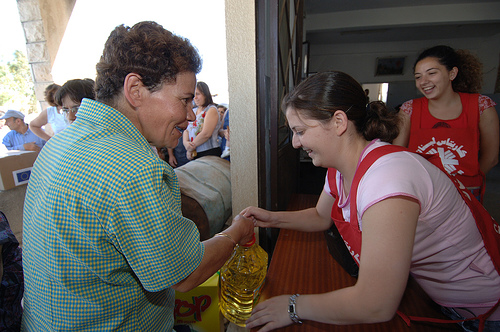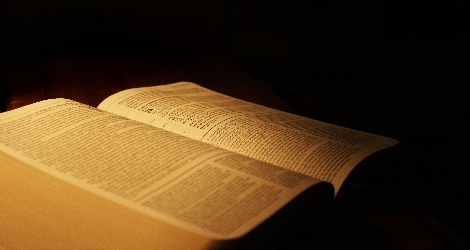[wpcol_1half id=”” class=”” style=””]
Jesus and the Kingdom of God: The incarnate economy
Soon enough, Babylon’s imperial pretensions proved false and its empire collapsed. It was replaced by others, until Rome conquered Judea in 63 B.C.E. At the time of Jesus, the Jewish people lived under the patronage system of the Empire, with its hierarchies of dependence, military rule, and stiff taxation. The Romans took the land from many peasants and gave it to their client-rulers, like Herod, who was King of the Jews in name only. The subsistence of peasant families was tenuous at best. Taxes, rents, and loan re-payment ate up more and more of their very limited wealth, as control over their lives and productivity slipped through their fingers into the grip of imperial officials, money lenders, and the regional elite. As a result, peasant farmers felt increasing pressure to hold tight to what little they had—restricting the circle of kinship obligations and distancing themselves from responsibility for the most vulnerable and marginal. Survival in such a context demanded a degree of hard-heartedness radically at odds with the generosity and open-handedness required by the Torah.
Into this environment, Jesus came proclaiming the renewal of God’s Kingdom and God’s family. The heart of his message was to “Repent, for the Kingdom of God is at hand” (Matt 4:17, cf. Mark 1:15). The Gospel according to Luke self-consciously connects this proclamation of the Kingdom with the Jubilee tradition of the Torah and the Prophets: “The Spirit of the Lord is upon me, because the Lord has anointed me to bring good news to the poor. The Lord has sent me to proclaim release to the captives and recovery of sight to the blind, to let the oppressed go free, to proclaim the year of the Lord’s favor” (Luke 4:18-19). And Matthew presents Jesus as an authoritative interpreter of the Torah, who rearticulates the true meaning of the covenant (Mt 5:17-20). Jesus said, do not store up treasures on earth, but treasures in heaven (Mt. 6:19-20), and no one can serve two masters…you cannot serve God and wealth (Mt. 6: 24), and do not worry about what you will eat or what you will wear “but strive first for the kingdom of God and God’s righteousness, and all these things will be given to you as well” (Mt. 6:33).
Jesus told parables about this Kingdom and its moral life that ran counter to rational behavior in the kingdoms of the world. The Kingdom of God, he proclaimed, is like a great banquet, but a banquet to which the lowliest of the low were invited and normal seating arrangements were turned on their heads (Luke 14:7-24). In fact, the rich and powerful were to be excluded from this feast, much as they excluded the poor and the powerless from their tables. He told a parable of the Kingdom in which the generous king forgave the massive debts of his servant and became furious when the servant would not forgive the comparatively paltry debts of others (Matthew 18:23-35).
[/wpcol_1half] [wpcol_1half_end id=”” class=”” style=””]
When brothers argued about their inheritance, Jesus told the story of a rich fool, who believed that his abundance of possessions, stored in many barns, provided security. But that very night he died and all his possessions were given into the hands of others. “So it is,” Jesus says, “with those who store up treasure for themselves but are not rich toward God” (Lk. 12:21). Each of these parables calls into question the hierarchical economic system of patronage that dominated the world at the time and offers an alternative kingdom in which forgiveness of debts and egalitarian sharing of resources are the norm.
Not only Jesus’ words, but also his deeds pointed toward this new reality that had drawn near. As God provided bread for the Israelites in the wilderness, so Jesus provided bread for the crowds in a deserted place, “and all ate and were filled” (Mt 14:20, cf Mt. 15:32-39, Mk 6:32-44, Mk 8:1-10, Lk 9:10-17, Jn 6:1-13). Similarly, Jesus sat at table and shared meals not only with the rich but also with the poor, not only with the clean but also the unclean, not only the righteous but also the unrighteous. If the table is the center of economic life, the place where the family gathers to consume what has been produced, then Jesus’ family was very large indeed.
The provision of food and the forgiveness of debts are also central to the prayer Jesus taught his disciples to pray (Mt 6:9-13, Mk. 11:25, Lk. 11:2-4). He taught them to call God Our Father, recognizing the kinship of all people in the family of God. Moreover, they asked God for their daily bread—recalling the manna God provided for Israel in the desert. And they asked that God forgive their debts as they forgave their debtors—making reference to the Sabbath provisions of the covenant.
Jesus not only fulfilled the messianic expectations, but also shattered them. He rode into town on a donkey rather than a warhorse. He told his disciples, “The son of man came not to be served but to serve” (Mt 20:28). And he insisted that his disciples similarly overturn the hierarchies of reward and become servants of all: “You know that the rulers of the Gentiles lord it over them, and their great ones are tyrants over them. It will not be so among you, but whoever wishes to be great among you must be your servant and whoever wishes to be first among you must be your slave” (Mt 20:25-27)
Little wonder that Jesus’ ministry and message met with resistance. But God raised Jesus from the dead, showing that God’s power and purpose cannot be thwarted by any human authority, no matter how intimidating or seemingly invincible.
[/wpcol_1half_end]





Unbound Social